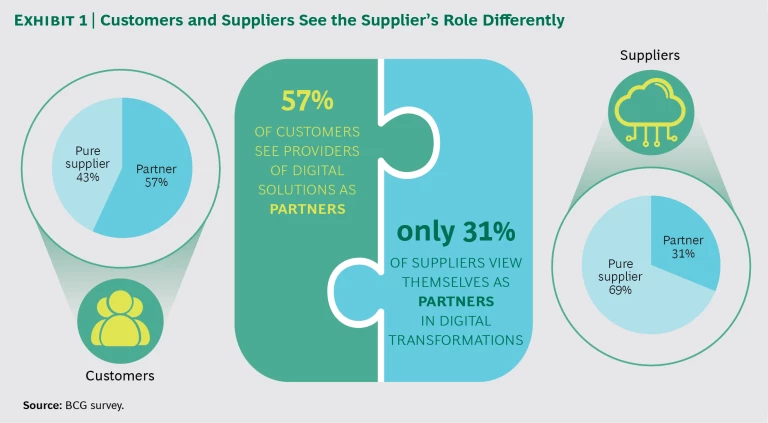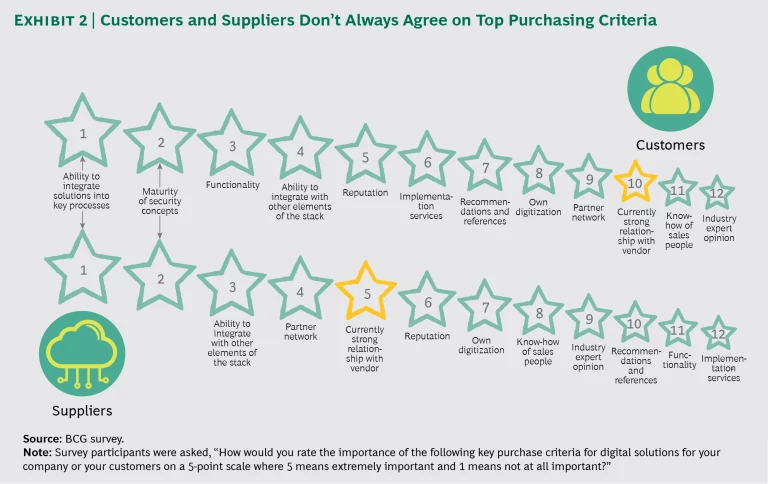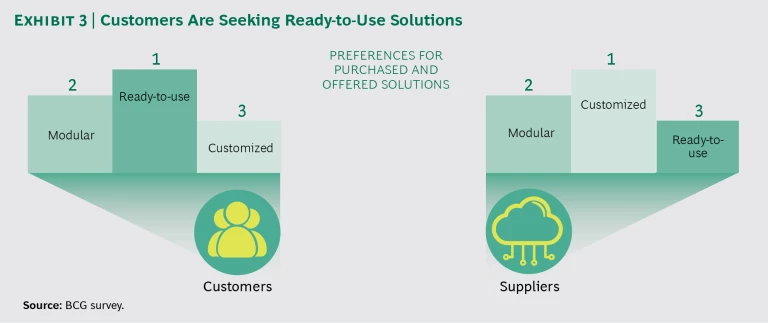There’s a big opportunity for digital suppliers out there, but unlocking the challenge is not an easy task.
Today, in just about every industry, companies are exploring—or pursuing—digital transformations to address multiple needs, including rising customer expectations and the need to adapt ever quicker to disruptive new business models and capabilities. Companies “get it.” They recognize that digital technologies are increasingly critical to driving sales and efficient operations. They see the need to become much more agile—to shorten the time to market and to accelerate product and service delivery, employing a more iterative manner. (See “ Simplifying IT to Accelerate Digital Transformation ,” BCG article, April 2016.) They also understand that they cannot succeed on their own: as technologies advance, a strong partner network becomes more and more important. Digital suppliers, including, technology and telecommunications companies, are well positioned to provide the help their corporate customers need—but only if they accurately assess customers’ requirements and ambitions and are able to tailor products and services accordingly as digital solutions.
BCG recently surveyed 300 digital suppliers and their corporate customers in Germany and the US on the subjects of digital transformations and their success factors. The respondents agreed that these are hot topics, and, collectively, they pointed to five ways digital suppliers can have an impact—and boost their business in the process.
Become True Digital Partners
Perhaps the biggest disconnect we encountered between digital suppliers and corporate customers—and the biggest opportunity for digital suppliers—is related to partnerships. There’s not much argument that partnerships matter: about 60% of customers and suppliers rate partnerships as either extremely or very important, and another 25% to 30% see them as important. Here’s the disconnect. Asked whether they viewed digital providers as suppliers or as partners for digital transformations, almost 60% of customers answered “partner” while about two-thirds of suppliers see themselves in a supplier role. (See Exhibit 1.)
Digital suppliers have a clear opportunity—and need—to deepen their customer relationships. Customers are asking them to do so. But suppliers need to broaden the relationship by thinking in terms of the business impact of integrated solutions rather than the technical benefits of products and services. They also should bear in mind that customers want to see real assets brought to the partnership: customers value partnerships with hardware and software providers (including cloud-based hardware and software services) and telecommunications companies—their most important partners when it comes to digital transformations.
There is a further challenge for suppliers: asked about purchase criteria for new digital solutions, customers assigned relatively low importance to the closeness of current relationships. The ability to integrate solutions into key business processes ranked first, followed by the maturity of a supplier’s security concepts and functionality. Customers indicated that, in times of digital transformation, they want a supplier to demonstrate value before they will expand the existing relationship—and that if they don’t see value from the existing relationship, they will be open to engaging a new supplier. (See Exhibit 2.)
The bottom line: customers are open to stronger partnerships, but suppliers must shift their focus and concentrate on the business issues corporate customers face and the ways that technology can help address those problems. The solutions digital suppliers offer should be designed in such a way that they can be easily integrated, which means that standardization is gaining greater importance. Suppliers should also take more responsibility for ensuring that customers derive the expected value from the solutions. Suppliers can help their cause by raising their visibility beyond the CIO organization so that senior corporate and business unit managers recognize them as partners. They should note the importance of business unit executives in this regard: transformations may be driven from the center, but more than 40% of corporate customers said that business units are ultimately involved in selecting providers of digital solutions.
It’s worth noting that there are differences between the German and US survey findings. For example, German customers rate the importance of partnerships higher than US customers, and German customers put more emphasis on strong partner networks and suppliers’ digital-transformation skills. Overall, however, the results are quite similar. The rising importance of digital transformation is a global trend. This positions technology (hardware and software) suppliers favorably: in general, they can act on a global basis, providing the same products and services across many markets. Telecommunications companies, which are viewed as especially important partners by their customers in Germany, can establish strong relationships built around connectivity services. There may also be room for new partnerships involving both tech and telecom players along the newly formed value chains that transformations set in motion.
Focus on the Basics; Then Go Beyond
When it comes to digital transformations, companies focus primarily on the basics. Three goals spur companies to undertake transformations: accelerated processes, higher revenues, and efficiency gains. Almost 70% of corporate customers in our survey cited efficiency gains and higher revenues as their top transformation goals.
Digital suppliers tend to think that their customers see a broader base of benefits, such as creating better customer experiences and collecting data for analytics programs, and they may be able to do a better job of making clear the link between establishing new technology-based capabilities and improving the top and bottom lines. First, however, these suppliers should make sure that their solutions are providing the benefits that customers are looking for. Suppliers must address the needs that impel customers to initiate digital transformations, ensure that their offerings respond directly to those needs, and make certain that customers recognize this. Suppliers can then make the connections with technology, the underlying mechanics, and the business impact. But, as we indicated above, suppliers that want to establish a solid partnership must not jump to the second step while the customer is still on the first step looking for precise answers.
Digital suppliers that put themselves in front of business—rather than IT—buyers will also be better positioned to highlight data-based and other digital capabilities. BCG research shows, for example, that even when they have consumers’ approval, companies often feel constrained from using consumer data for such efforts as third parties’ marketing of products, anonymous use, and nonanonymous use. (See “ Bridging the Trust Gap: Why Companies Are Poised to Fail with Big Data ,” BCG article, October 2016.) This sort of observation will likely have a bigger impact on the CMO than the CIO.
Make an Immediate Impact
Companies are concerned about cost. In response to an open-ended question, about one-quarter of respondents volunteered that cost is the biggest single obstacle to transformation. Full-scale transformations may take years, and most require massive investment. How do companies balance the need to transform models and operations with the equally critical need to manage their business during the transformation? How do they avoid a costly multiyear program that generates value only at the very end? (See “ Generating Value While Transforming Insurers’ Legacy Technology ,” BCG article, December 2016.) Each corporate customer is very likely at a different point on its digital-transformation journey—from just getting started to having some form of transformation program up and running—and where each one stands clearly affects its immediate priorities.
For example, digital suppliers working with customers that are in the early stages of transformation should focus on ways to support the transformation journey in the near term. Improved efficiency and lower costs that result from more effective process automation are clear measures of success. Technology solutions that quickly enable new services for the corporate customer—for instance, facilitating the collection of customer information—are also quick wins. Digital suppliers can point to several ways that customers can measure gains, including higher cross-sales and retention or conversion rates that lead to better customer satisfaction and more advocacy.
Assign High Value to Digital Skills
Companies may value the impact of digital capabilities, but they underestimate the importance of digital skills as performance enablers. Only about one-third of the companies had assigned high importance to digital transformation accelerators such as talent acquisition.
BCG research in the consumer marketing field has revealed that even as digital spending increases, digital skill levels remain low, and companies face the biggest shortfalls in such critical skills as those related to mobile, video, testing, partner management, and organizational capabilities. And the importance of these skills in the next several years will only increase. (See The Talent Revolution in Digital Marketing , BCG Focus, September 2015.)
Digital suppliers have a much better understanding of the importance of talent and other digital accelerators. (Indeed, 17% of suppliers cited poor HR quality as the greatest obstacle to digital transformation.) Suppliers have the opportunity to put their own talent to work on behalf of their corporate customers, but, as partners, they should also help their customers understand and bridge the talent divide. (If they do not, companies that acquire expensive technologies, only to have them fail for lack of people who know how to use them, might blame their suppliers.)
Don’t Over-Engineer
On the one hand, companies seeking to digitize their business processes have plenty of choices—off-the-shelf products; cloud-based services, such as software or platform as a service; customized solutions developed and implemented by the supplier; and, most likely these days, an ecosystem of suppliers. Perhaps it is not surprising that digital suppliers see their customized solutions as the most relevant. (See Exhibit 3.) On the other hand, customers are most often looking for ready-to-use solutions, and, among companies seeking to streamline their processes and operations, there is a clear trend toward standardized cloud solutions. Newer entrants with cloud-based models (Salesforce.com is a leading example) have taken advantage of this opportunity to quickly become major players.
Corporate customers want to have their cake and eat it, too: they are looking for off-the-shelf solutions as well as help integrating the solutions and making them work in their particular environment. This is different from a customized solution that is made to order and built to a corporate customer’s specifications. But digital suppliers that have specialized in the latter will need to embrace the former as cloud-based solutions continue to gain traction, for the compelling reason that companies get a big bang for their buck.
For example, a midsize retailer can reduce baseline IT costs by 47% by replicating its existing IT stack in the cloud, thereby freeing up funds that can be reinvested in the business. In a 2016 BCG survey of 750 CIOs of midsize US companies, 65% of respondents reported that they expect to move workloads to a public or private cloud by 2017. (See “ Can Your Network Deliver the Potential of the Cloud? ” BCG article, February 2016.)
The increasing flexibility of standardized cloud-based solutions will further boost their adoption, and suppliers that stay committed to their own customized solutions are missing an opportunity to combine cost-effective solutions with efficient implementation—an important lever for streamlining technology and generating instant impact to the bottom line.
The opportunity is there, but do digital suppliers have what it takes to win? Today’s digital suppliers are doing an adequate job of meeting their customers’ transformation needs, but there is plenty of room for improvement. More than 80% of customers say that their suppliers at least partially fulfill their needs, but less than 35% describe their needs as completely or almost completely met.
At the same time, corporate customers are looking for partners that can create impact fast as they move through the transformation journey. The winners will be the digital suppliers that can demonstrate to business and IT buyers that that they are focused on value, understand the challenges of digital transformations, have the ability to help fund the journey with early successes, and can accelerate the transformation agenda with integrated, ready-to-use digital solutions.












